Appointment Scheduling Market - Global Forecast 2030
The global appointment scheduling market, valued at US$342.3 million in 2023, is forecasted to grow at a robust CAGR of 13.8%, reaching US$386.7 million in 2024 and an impressive US$803.7 million by 2030. Growth of the market is mainly driven by the increasing need to optimize medical resources, enhance patient satisfaction and reduce patient wait times. Furthermore, the incorporation of cutting-edge technological solutions, such as generative Al, into appointment scheduling systems is greatly accelerating market growth.
Global Appointment Scheduling Market Trend
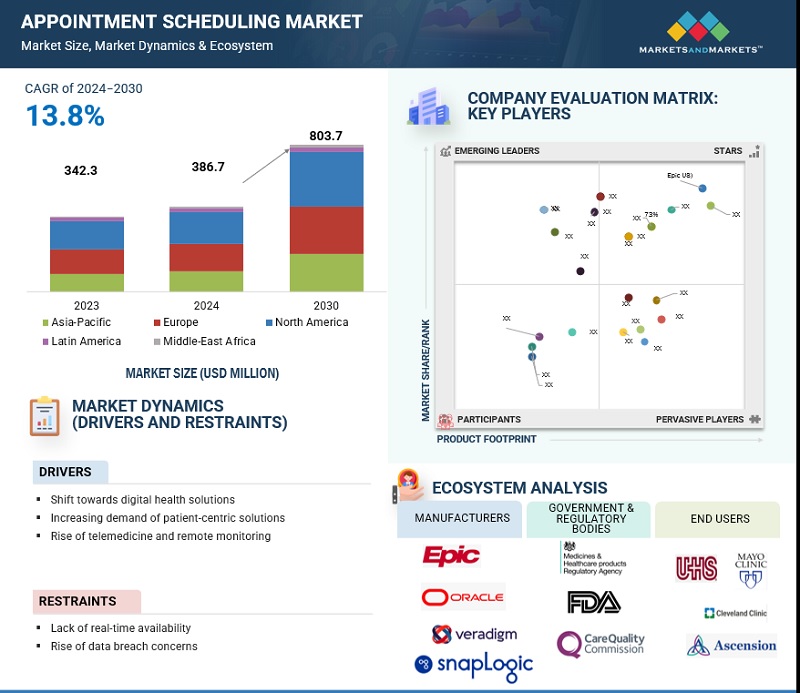
To know about the assumptions considered for the study, Request for Free Sample Report
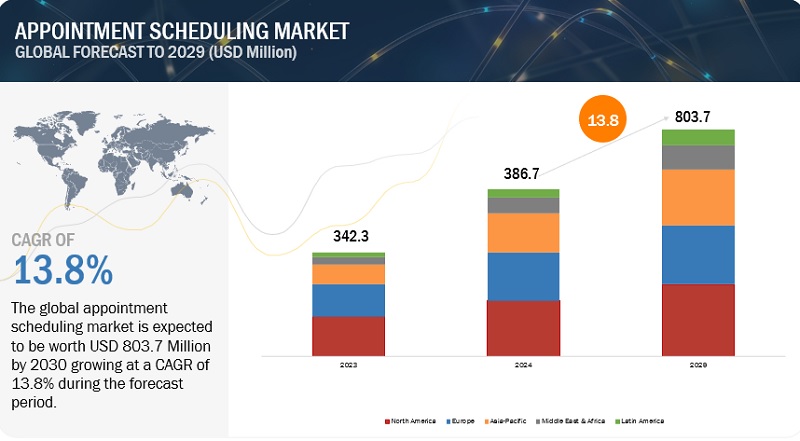
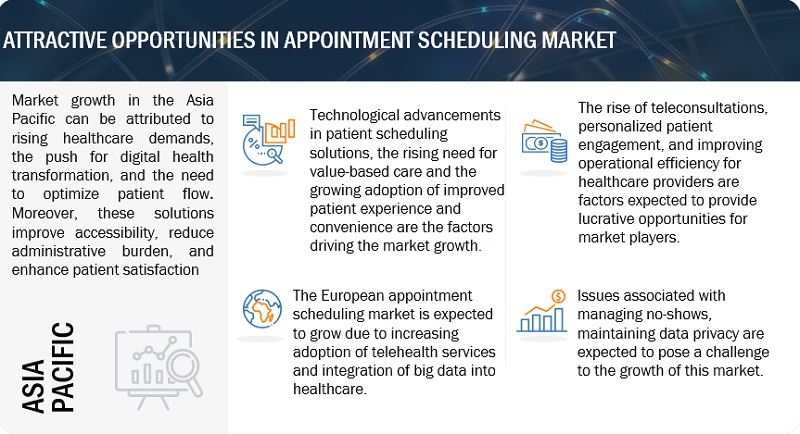
Global Appointment Scheduling Market Dynamics
Driver: Transforming Patient Care Through Innovating Appointment Scheduling Solutions
A key driver in the healthcare appointment scheduling software market is its capacity to enhance the patient experience by providing increased convenience, accessibility, and effectiveness. Online scheduling enables patients to schedule appointments at any time and from any location, accommodating the requirements of hectic lifestyles and responding to the need for availability after hours, with as much as 34% of meetings set for outside regular office hour. Additionally, scheduling meetings can help the clinic better manage its time, which will cut down on patient wait times. For instance, a Docrespose article found that 60% of respondents were hesitant to wait more than a minute when scheduling an appointment, suggesting that waiting on hold could make them anxious.
Restraint: Lack Of Real-Time Availability And Data Breach Concerns
One crucial restraining factor in appointment scheduling systems is real-time availability. The possibility of multiple appointments or missed appointments increases when systems are unable to update the slot availability promptly. Furthermore, the market for appointment scheduling is severely constrained by data breaches, mainly because of the high expenses and increased regulatory attention that come with data security breaches.
Opportunity: Increasing Adoption Of Advanced Technological Solutions
The adoption of advanced technological solutions like the implementation of Gen AI technology in the existing appointment scheduling system solutions is creating significant growth opportunities for the market. This technology is able to streamline the appointment scheduling process by automating the rescheduling and booking of patient appointments and optimizing the available time slots. To leverage this, several companies are prioritizing implementing GEN AI technology into their existing solution. For instance, Snaplogic, a US-based company, has implemented Gen AI technology for patient appointments; this technology helps in creating its own automation application to handle patient automation booking and scheduling. Moreover, the solution provides real-time appointment availability, sends automated reminders, and personalizes scheduling. Thus, integrating advanced technologies into existing software solutions creates a growth opportunity to provide higher patient satisfaction and streamlined operations, ontributing to market growth.
Challenge:Demand and Supply Mismatch
The appointment scheduling solution market faces significant challenges, including a mismatch between patient demand and the availability of doctor slots. Additionally, patient no-shows and cancellations result in wasted time and revenue loss. To overcome these challenges, several companies are adopting solutions that leverage data from past enrollments to predict future demand, adjust doctor schedules to align with peak periods, and enable online booking with waiting lists for new patients. Thus, implementing reminder systems through text and email, and analyzing cancellation data can further reduce no-shows.
Appointment Scheduling Market Ecosystem
The appointment scheduling market is highly competitive, with a large number of intermediaries involved. The market includes Appointment Scheduling vendors, ranging from large enterprises to niche players, that develop and provide innovative solutions deriving insights. These vendors navigate regulatory frameworks set by government bodies like the FDA, EMA, and Health Canada, ensuring compliance with standards and guidelines related to data security, interoperability, and patient privacy. Moreover, government bodies such as the Department of Health and Human Services (HHS) and the National Health Service (NHS) influence market dynamics through policy decisions, funding initiatives, and regulatory oversight. Meanwhile, end-users, comprising healthcare providers such as hospitals, clinics, dmenad for appointment scheduling solutions to streamline workflow efficiency, and enhance patient care delivery. This interconnected ecosystem relies on collaboration, innovation, and adherence to regulatory requirements to ensure the seamless integration and effective utilization of Appointment Scheduling solutions within the healthcare landscape.
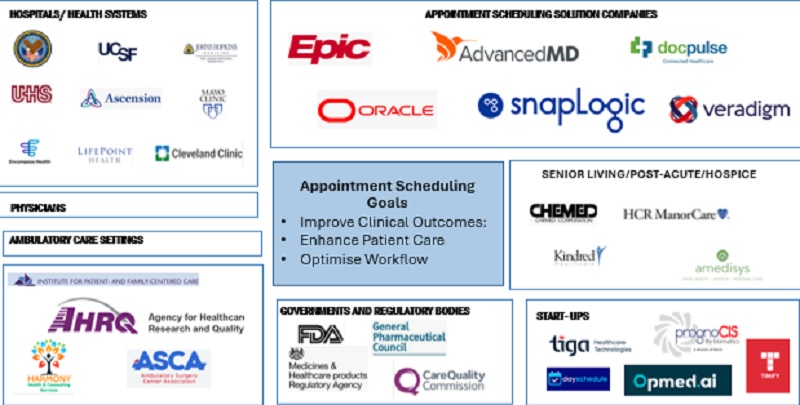
To know about the assumptions considered for the study, download the pdf brochure
By offering, the patient scheduling segment accounted for the largest share of the appointment scheduling market in 2023.
By offering, the market is segmented into patient scheduling and care provider scheduling segments. Patient scheduling software solutions dominated the market in 2023 due to their ability to address both patient convenience and operational efficiency. A key feature driving their popularity is self-scheduling, which empowers patients to book, manage, and cancel appointments directly from their devices at any time. This 24/7 flexibility eliminates the need for patients to call during office hours, offering a seamless, patient-centered experience that aligns with modern expectations for digital accessibility.
Moreover, several key market players are driving the growth of the patient scheduling system market by integrating advanced technologies such as AI and predictive analytics. Solutions like Veradigm’s Predictive Scheduler exemplify this trend by leveraging population-level data and predictive models to optimize scheduling. These tools enhance flexibility in physician schedules, prioritize high-need patients, and adapt to dynamic demands while adhering to complex scheduling and reimbursement rules. By minimizing open slots, accommodating emergencies, and streamlining workflows, these innovative solutions reduce administrative burdens and improve patient care, fueling market growth.
By deployment, cloud-based segment will grow at the fastest CAGR in the forecast period.
Based on deployment, the appointment scheduling market is segmented into on-premise and cloud-based. Cloud-based deployment model in healthcare appointment scheduling systems is expected to grow at the fastest CAGR during the forecast period as these solutions offer seamless real-time updates to ensure that every data change is instantly captured and reflected on the dashboard. Additionally, the model eliminates the need for upfront hardware investments, provides exceptional scalability, and adopts a cost-effective pay-as-you-go pricing structure. These advantages are anticipated to drive the growing demand for cloud-based healthcare appointment scheduling system solutions.
North America accounts the largest share of Appointment Scheduling market in 2023.
The Appointment Scheduling market is segmented by region into North America, Europe, Asia Pacific, Latin America, and the Middle East and Africa. In 2023, North America accounted for the largest share of the market as the demand for appointment scheduling system solutions is driven by the critical need to address healthcare inefficiencies and improve patient outcomes. Missed appointments, or "no-shows," significantly strain the US healthcare system, contributing to delays in treatment, resource wastage, and increased operational costs—estimated to exceed USD 150 billion annually, according to Health Management Technology.
In response to these challenges, healthcare providers are increasingly adopting appointment scheduling solutions to streamline patient bookings, reduce no-show rates, and optimize resource utilization. This widespread adoption is driving substantial growth in the appointment scheduling market.
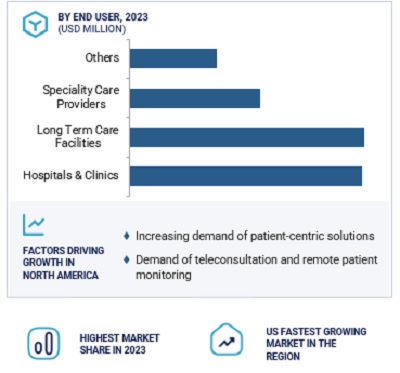
Key Market Players
- Tebra Technologies Inc (US)
- Epic Systems Corporation. (US)
- Oracle (US)
- Docpulse (India)
- Q-Matic AB (Sweden)
- Zoho Corporation Pvt. Ltd. (India)
- Tiga Healthcare Technologies. (Turkey)
- AdvancedMD Inc. (US)
- LeadSquared (India)
- Reservio. (US)
- Setmore Appointments (US)
- NEXHEALTH (US)
- Kyruus Inc. (US)
- SnapLogic Inc. (US)
- Skedulo Holdings Inc. (US)
- OSP LABS (US)
- RevenueXL Inc. (US)
- Veradigm LLC (US)
- Experian Information Solutions Inc. (US)
- DexCare Inc. (US)
- Mobisoft Infotech (US)
- Bizmatics Inc. (US)
- Opmed.ai (US)
- dayschedule (India)
- TIMIFY (India)
Recent Developments in the Appointment Scheduling Market:
- In November 2024, HealthPlix (India) has launched an integration with Google to simplify healthcare access. This integration will enable patients to book appointments directly with doctors using the company's software, affiliated with clinics with a Google Business Profile. The integration helps enhance patient convenience, streamline clinical operations, and enable a frictionless experience for both patients and doctors. By allowing patients to schedule their appointments directly through the Google platform, the company is transforming clinicians' accessibility and making access to healthcare more efficient.
- In August 2024, Relatient (US) has launched the enhanced version of self-scheduling tool. This upgraded version redefines the patient experience, and offers advanced configuration options for provider organizations.
- In January 2024, SnapLogic (US) introduced GenAI Builder, a groundbreaking no-code platform for generative AI application development, specifically designed to streamline patient scheduling processes.
Frequently Asked Questions (FAQ):
1. Which are the top industry players in the Appointment Scheduling market?
Prominent players in the Appointment Scheduling market include Tebra Technologies, Inc (US), Epic Systems Corporation. (US), Oracle (US), Docpulse (India), Q-Matic AB (Sweden), Zoho Corporation Pvt. Ltd. (India), Tiga Healthcare Technologies. (Turkey), AdvancedMD, Inc. (US), LeadSquared (India), Reservio. (US), Setmore Appointments (US), NEXHEALTH (US), Kyruus, Inc. (US), SnapLogic Inc. (US), Skedulo Holdings, Inc. (US), OSP LABS (US), RevenueXL Inc. (US), Veradigm LLC (US), Experian Information Solutions, Inc. (US), DexCare, Inc. (US), Mobisoft Infotech (US), Bizmatics, Inc. (US), Opmed.ai (US), dayschedule (India), TIMIFY (India)
2. Which offering has been included in the Appointment Scheduling market report?
- Patient Scheduling
- Care Provider Scheduling
- Others
3. Which geographical region is dominating in the Appointment Scheduling market?
The Appointment Scheduling market is segmented into North America, Europe, Asia Pacific, Latin America, and Middle East and Africa. North America holds the largest share and APAC registers the highest growth during the forecast period in the Appointment Scheduling market.
4. Which end-user segments have been included in the Appointment Scheduling market report?
The report contains the following end-user segments:
- Hospitals & Clinics
- Long Term Care Facilities
- Speciality Care Providers
- Others
5. What is the total CAGR expected to be recorded for the Appointment Scheduling market during 2024-2029?
The CAGR is expected to record a CAGR of 13.8% from 2024-2030.
To speak to our analyst for a discussion on the above findings, click Speak to Analyst
















Growth opportunities and latent adjacency in Appointment Scheduling Market